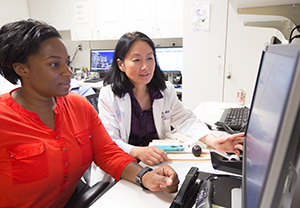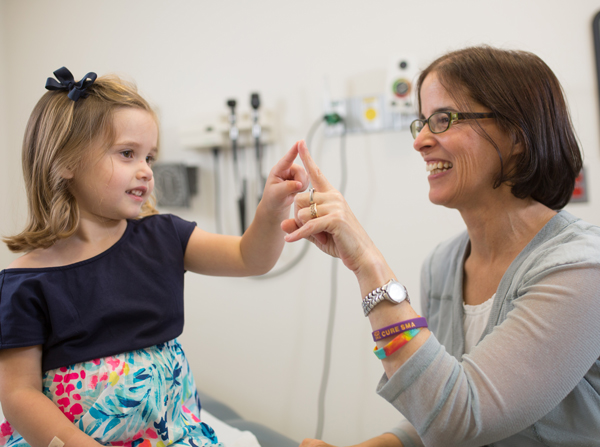Epilepsy Neurogenetics Initiative
About Us
The vision for the UNC Epilepsy Neurogenetics Initiative (ENGI) is to apply our expanding scientific knowledge of epilepsy genetics to patient care as we learn more about specialized treatments and medicines.
To achieve this goal, UNC child neurologists, geneticists, and researchers collaborate to build a comprehensive and multidisciplinary program that advances the care of patients with genetic epilepsy. These partnerships serve as the foundation for the clinical and translational research conducted through our Epilepsy Neurogenetics Clinic and the Epilepsy Neurogenetics Translational Research Collaboration.
 Services and Programs
Services and Programs
The ENGI clinic is committed to providing specialized care to our patients with genetic epilepsy. We prepare individualized treatment plans for each of our patients with the guidance of our multidisciplinary team of experts in child neurology, epilepsy and genetics who discuss each case during their weekly resolution meetings.
The clinic also offers the services of a genetic counselor, a social worker, and referral coordinators to provide additional patient support.
In addition, UNC Children’s Hospital and the ENGI provide access to pediatric neuropsychology, neuropsychiatry, pediatric physical medicine and rehabilitation and pediatric therapies (including physical, occupational and speech therapy).
Who do we treat?
We offer patient and family-centered care for:
- Children with known or suspected genetic epilepsy syndromes
- Children with epilepsy and unclear or non-diagnostic genetic testing results (including variants of unknown significance)
- Children with epilepsy with a prior genetic diagnosis that requires additional evaluation
What types of treatments do we offer?
The ENGI clinic offers a wide array of therapeutic options including anti-seizure medicines, individualized diets (managed by a specialized pediatric dietician), neurostimulation device therapies, and surgical management.
How is a diagnosis made?
We perform a comprehensive evaluation for each patient and offer a full spectrum of state-of-the-art diagnostic tools to help understand the cause of each child’s seizures and improve care.
These tools include:
- Extensive medical history review
- Detailed family history review
- Comprehensive neurological exam
- EEG (interpreted by pediatric epileptologists)
- Routine and ambulatory EEG
- Continuous video monitoring in the state-of the-art epilepsy monitoring unit in UNC Children’s Hospital’s Level 4 Epilepsy Center, recognized by the National Association of Epilepsy Centers (NAEC)
- Brain imaging reviewed by neuroradiologists
- MRI (1.5T, 3T and research 7T MRI)
- SPECT
- PET CT and PET MRI
- fMRI
- Genetic testing (reviewed by our multidisciplinary team including neurologists, epileptologists, genetists and genetic counselors)
- Metabolic testing
Research
UNC researchers are exploring ways to improve the lives of children with epilepsy. The clinic offers access to this innovative research. Learn more about our research programs >
Education
As a part of the UNC Children’s Hospital and the UNC School of Medicine’s academic medical center, we are committed to training the next generation of doctors to provide care for children with known or suspected genetic epilepsies. ENGI offers top-tier educational opportunities and mentoring to medical students, residents and fellows.
Outreach
ENGI’s goal is to serve as a local and state resource for patients with epilepsy. We strive to serve children with epilepsy and provide access to evaluations and specialized care by subspecialty experts and multidisciplinary consultations.
Our outreach program aims to:
- Create a statewide referral base of neurologists and pediatricians;
- Maintain an online presence to expand the visibility and reach to families and physicians;
- Establish healthcare collaborations across North Carolina.
- Increase access to medically underserved individuals.

